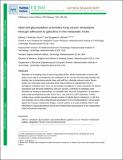Aberrant Glycosylation Promotes Lung Cancer Metastasis through Adhesion to Galectins in the Metastatic Niche
Author(s)
Reticker-Flynn, Nathan E.; Bhatia, Sangeeta N
DownloadBhatia_Aberrant glycosylation.pdf (5.335Mb)
OPEN_ACCESS_POLICY
Open Access Policy
Creative Commons Attribution-Noncommercial-Share Alike
Terms of use
Metadata
Show full item recordAbstract
Metastasis is the leading cause of cancer-associated deaths. Although dissemination of tumor cells likely occurs early in tumorigenesis, the constituents of the microenvironment play essential rate-limiting roles in determining whether these cells will form clinically relevant tumors. Recent studies have uncovered many molecular factors that contribute to the establishment of a protumorigenic metastatic niche. Here, we demonstrate that galectin-3, whose expression has clinical associations with advanced malignancy and poor outcome, contributes to metastatic niche formation by binding to carbohydrates on metastatic cells. We show that galectin-3 is expressed early during tumorigenesis by both CD11b[superscript +]Gr-1[superscript + ]and CD11b[superscript +]Ly-6C[superscript hi] leukocytes. Tumors mobilize these myeloid populations through secretion of soluble factors, including IL6. We find that metastatic cancer cells exhibit elevated presentation of the oncofetal galectin-3 carbohydrate ligand, the Thomsen–Friedenreich antigen, on their surfaces as a result of altered C2GnT2 and St6GalNAc4 glycosyltransferase activity that inhibits further glycosylation of this carbohydrate motif and promotes metastasis.
Date issued
2014-11Department
Harvard University--MIT Division of Health Sciences and Technology; Massachusetts Institute of Technology. Department of Electrical Engineering and Computer Science; Koch Institute for Integrative Cancer Research at MITJournal
Cancer Discovery
Publisher
American Association for Cancer Research
Citation
Reticker-Flynn, N. E., and S. N. Bhatia. “Aberrant Glycosylation Promotes Lung Cancer Metastasis through Adhesion to Galectins in the Metastatic Niche.” Cancer Discovery 5, no. 2 (November 24, 2014): 168–181.
Version: Author's final manuscript
ISSN
2159-8274
2159-8290